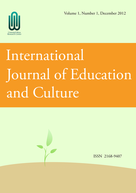


Volume 12 Issues 3-4 (2023-12-31)
Volume 12 Issues 1-2 (2023-06-30)
Volume 10 Issues 1&2 (2021-06-30)
Volume 9 Issues 3&4 (2020-12-31)
Volume 9 Issues 1&2 (2020-06-30)
Volume 8 Issues 3&4 (2019-12-31)
Volume 8 Issues 1&2 (2019-06-30)
Volume 7 Issues 3&4 (2018-12-31)
Volume 7 Issues 1&2 (2018-06-30)
Volume 6 Issues 3&4 (2017-12-31)
Volume 6 Issues 1&2 (2017-06-30)
Volume 5 Issues 3&4 (2016-12-31)
Volume 5 Issues 1&2 (2016-06-30)
Volume 4 Issues 3&4 (2015-12-31)
This short essay was written during the time of: rising coronavirus cases, particularly among Blacks and other minorities, increased racial tension, and the call for justice and fairness in all systems within the United States of America. As a highly concerned educator, I am here renewing the call for more equality and the addressing of the needs of Black People, specifically focusing my attention on Little Black Boys and Girls (our children/our students) within the American K–12 educational system.
A curriculum vita is a tool used to provide a summary of an applicant’s experiences, qualifications, accomplishments, or skills. It is an important component used to evaluate both employment and medical school applicants. Given that it is such a highly valued tool in society, it is imperative to examine the literature on the use of curriculum vitae in medical school admissions. The objective is to review, evaluate, and synthesize the results of studies related to the use of curriculum vitae in medical school admissions with respect to the quality of the measures, such as reliability, validity, and feasibility. A total of three studies met the inclusion criteria. All studies used some form of curriculum vitae, the autobiographical sketch (ABS). Hanson et al. (2012) reported that the inter-rater reliability of the ABS using the Multiple Independent Sampling (MIS) method with a single rater was 0.51. Leddy et al. (2011) reported that the internal consistency of the ABS was 0.68 and 0.69 in 2006 and 2007, respectively. No correlation was found between the emotional intelligence (EI) scores and the ABS. Peskun et al.(2007) determined a correlation between those who have scored higher on the ABS and a higher rank in Internal Medicine and Family Medicine residency applications. Despite a comprehensive search strategy, the few studies found provided minimal information on the use of the curriculum vitae for medical school admissions. Additionally, the included studies were of inadequate or doubtful methodological quality; therefore, more research is needed to justify the use of the curriculum vitae in medical school admissions.
Peer assessment in L2 writing is an important supplementary form of teacher assessment but also the key to encouraging and consolidating students’ learning. This article reviews both student- and instructor-related factors affecting the peer assessment in L2 writing. Student-related factors include their English proficiency, writing ability, role and status, and some cognitive and emotional factors. Instructor-related factors include their interference and training. Implications for L2 peer assessment are discussed.